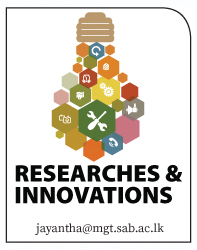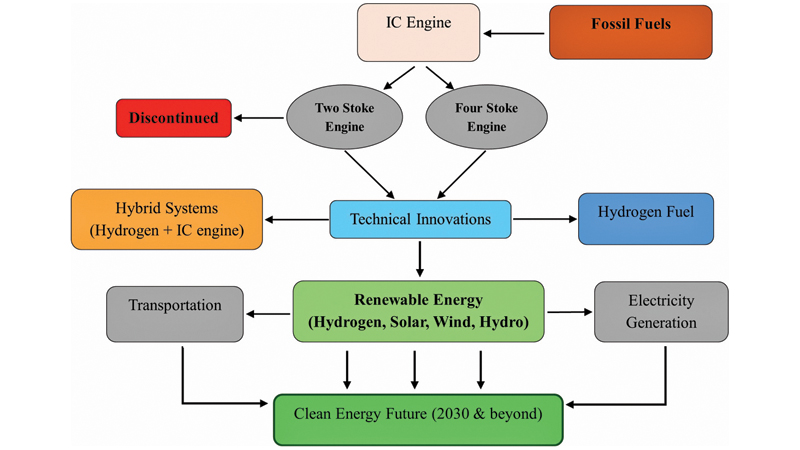 As the world grapples with the escalating impacts of climate change, the race to replace fossil fuels with cleaner energy sources has taken centre stage. Two sectors leading this transformation are electricity generation and transportation, which have long relied heavily on fossil-based fuels like coal, oil, and natural gas.
As the world grapples with the escalating impacts of climate change, the race to replace fossil fuels with cleaner energy sources has taken centre stage. Two sectors leading this transformation are electricity generation and transportation, which have long relied heavily on fossil-based fuels like coal, oil, and natural gas.
However, the tide is turning. Renewable energy technologies, such as solar, wind, and hydrogen, are rapidly gaining traction, offering a sustainable alternative to traditional energy sources. Among these, hydrogen fuel cells and advancements in engine technology, particularly the shift from two-stroke to four-stroke engines, are emerging as key players in the clean energy revolution. These innovations reshape industries and pave the way for a cleaner, healthier planet.
Visualising the shift

M.B.D.K.
Siriwardena
The transition from fossil fuels to renewable energy is underway, and the numbers tell a compelling story. As per the data, in transportation, renewables are projected to grow from a mere 2% share in 2020 to 40% by 2030, driven by hydrogen-powered vehicles and electric cars. Similarly, renewables are expected to rise from 10% to 50% in electricity generation, with solar, wind, and hydropower leading the charge. These trends highlight a clear trajectory: Fossil fuels are declining, and renewables are set to dominate the energy landscape in the coming decade.
Four-stroke engines
For decades, two-stroke engines have been the go-to choice for small vehicles and machinery, from motorcycles and scooters to lawnmowers and boats. Their simplicity, lightweight design, and low manufacturing costs made them popular. However, their environmental drawbacks have become impossible to ignore. Two-stroke engines burn a mix of fuel and oil, leading to incomplete combustion and the release of harmful pollutants like carbon monoxide and hydrocarbons. They are also notoriously fuel-inefficient, consuming more energy to produce the same power as their four-stroke counterparts.

Dr. A.R.Nihmiya
Enter the four-stroke engine cleaner, a more efficient alternative. Unlike two-stroke engines, four-stroke engines operate in four distinct phases: intake, compression, power, and exhaust. This process allows for more complete combustion, reducing emissions and improving fuel efficiency by up to 30%. While four-stroke engines are more complex and costly, their long-term benefits outweigh these drawbacks. Figure 1comprehensively overviews the transition from internal combustion engines to clean energy systems.
Countries around the world are embracing this shift. In Thailand, the government has phased out two-stroke tuk-tuks and motorcycles, replacing them with four-stroke models. This move has already improved air quality in cities like Bangkok by 20% in just five years.
Similarly, Norway has incentivised fishermen to adopt four-stroke outboard engines, reducing fuel costs and protecting marine ecosystems from oil spills. These examples demonstrate how small engine technology changes can significantly impact the environment and the economy.
Hydrogen

Dr. Udara S.P.R. Arachchige
While four-stroke engines are revolutionising small vehicles, hydrogen is emerging as a game-changer for more extensive transportation needs. Hydrogen fuel cells combine hydrogen with oxygen to produce electricity, with water vapour as the only byproduct. This zero-emission technology is up-and-coming for long-haul trucking, shipping, and aviation sectors where battery-powered electric vehicles face limitations.
One of hydrogen’s greatest strengths is its versatility. It can be produced through various methods, the most sustainable being electrolysis—using renewable energy sources like wind or solar power to split water into hydrogen and oxygen. This process, known as green hydrogen, produces no harmful emissions. However, hydrogen can also be derived from fossil fuels, resulting in what is known as brown hydrogen. The environmental impact of hydrogen energy depends mainly on how it is produced, making green hydrogen the preferred option for a sustainable future.
Real-world applications of hydrogen are already proving its potential. Germany has introduced the Coradia iLint, the world’s first hydrogen-powered passenger train, which has replaced diesel models in Lower Saxony and cut CO2 emissions by 1,000 tons annually. South Korea is investing heavily in hydrogen infrastructure, with plans to deploy 1,200 hydrogen buses and build 450 refuelling stations by 2025. In the aviation sector, startups like ZeroAvia are testing hydrogen-powered planes for short-haul flights, aiming to decarbonise air travel by 2030.
Despite its promise, hydrogen faces challenges. Infrastructure costs and safety concerns persist, though innovations in leak-proof storage tanks address these issues. Additionally, the affordability of hydrogen-powered vehicles remains a barrier for many, particularly in developing countries.
Why these changes matter
The shift to hydrogen and four-stroke engines is not just about adopting new technologies but also addressing the urgent need to reduce greenhouse gas emissions and combat climate change. Governments and industries worldwide are investing billions to accelerate this transition. The European Union, for example, aims to build 1,000 hydrogen refuelling stations by 2030, while countries like Thailand and Brazil are phasing out two-stroke engines entirely.
These changes also bring significant economic benefits. The renewable energy sector is creating millions of jobs globally, from manufacturing hydrogen fuel cells to building wind turbines and solar panels. At the same time, the improved efficiency of four-stroke engines saves consumers money on fuel costs, making them a practical choice for everyday use.
The road ahead
The future of transportation and energy is bright, with hydrogen and four-stroke engines playing pivotal roles. By 2025, hydrogen trucks are expected to dominate European highways, and four-stroke engines will become standard in 90% of new motorcycles. By 2030, renewables will supply 40% of global transport energy, and hydrogen-powered planes could make up 15% of short-haul fleets.
These projections are not just numbers but represent a fundamental shift in how we power our world. From silent, zero-emission trucks on highways to planes fuelled by water-based hydrogen, the possibilities are endless. Cities could see asthma rates drop as air quality improves, and marine ecosystems could recover as oil spills become a thing of the past.
Conclusion
The clean energy revolution is no longer a distant dream. It is happening now.
Hydrogen fuel cells and four-stroke engines are at the forefront of this transformation, offering tangible solutions to cut emissions, improve air quality, and reduce our reliance on fossil fuels. Governments, industries, and communities worldwide are collaborating to accelerate this shift, from the European Union’s hydrogen infrastructure projects to India’s push for four-stroke motorcycles.
Challenges remain, but the progress is undeniable. By embracing these innovations, we’re battling climate change and paving the way for healthier cities, quieter streets, and a stable planet. The clean energy era is here, and every step forward brings us closer to a world where sustainability and progress go hand in hand.
By:
Mr. M.B.D.K. Siriwardena, MPhil in Industrial Technology (reading), Faculty of Technology, University of Sri Jayewardenepura, Dr. A.R. Nihmiya, Senior Lecturer, Faculty of Technology, University of Sri Jayewardenepura and Dr. Udara S.P.R. Arachchige, Senior Lecturer, Faculty of Engineering, NSBM Green University




